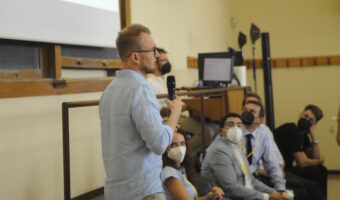Piotr Lewandowski presented the paper “Mismatch in preferences for working from home – evidence from discrete choice experiments”. The study, co-authored with Katarzyna Lipowska and Mateusz Smoter, is based on two discrete choice experiments with workers and employers in Poland. It shows a large discrepancy between the preferences of workers and employers: the share of earnings that workers are willing to sacrifice to be able to work from home is much lower than the wage cuts that employers expect to grant such an option. Only in the minority of firms that find working from home productive the preferences of workers and employers align. The study concludes that despite the optimism regarding the widespread adoption of remote work in the aftermath of the COVID-19 pandemic, working from home will probably remain a privilege for higher-skilled workers in a subgroup of firms that often used such arrangements even before the pandemic.
Piotr Lewandowski presented the paper on the employer-employee mismatch in preferences for working from home in the flash talk session “Automation, robots, and the future of labour”. A policy brief based on this session, along with video interviews with the President of EALE, Michele Belot, the local Chair Organizer of the conference Lorenzo Rocco, and the two keynote speakers, Paolo Pinotti and Andrea Weber, is available at the conference website
Professor Magda shared the results of research carried out by a team from the Warsaw School of Economics, Warsaw University and the National Information Processing Institute.
The study concerned the gender pay gap among STEM graduates.


